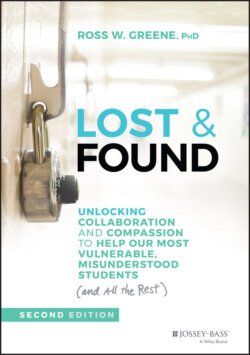Читать книгу Lost and Found - Ross W. Greene - Страница 13
COMPONENT 3: FOCUS ON PROBLEMS, NOT BEHAVIORS
ОглавлениеYou've actually read a bit about this component already. But here's another metaphor to further the discussion: concerning behaviors are what are happening downstream; the problems that are causing those behaviors are waiting for you upstream. In the CPS model, you're focused almost exclusively on what's going on upstream.
In other words, concerning behavior is late. And interventions that are aimed at modifying behavior are focused on what's late. By the time the behavior occurs, you're already in crisis management mode. The problems that are causing those behaviors are early. When you're solving problems proactively, you're in crisis prevention mode.
If concerning behavior is all we focus on in our discussions and meetings, then we will be led only to interventions that are geared toward modifying that behavior. And behavior modification strategies don't solve any problems.
“Everybody knows what the kid's challenging behaviors are—you can figure that out in two seconds—but you have to go deeper.”
—NINA, PRINCIPAL
This shift in focus has significant implications for assessment. Many of the assessment practices employed in schools—behavior observations, behavior checklists, functional behavior assessments (FBAs)—are focused on a student's behaviors. If we're going to change our lenses, we'll also need to change our assessment practices. More on this in chapter 4.
